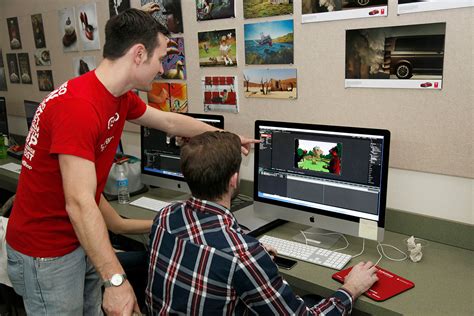Are you a passionate gamer with a creative edge? Do you dream of turning your love for games into a fulfilling career? Look no further than the world of game design and development programs offered at American universities. In recent years, there has been a surge in demand for such programs, and it’s no surprise why. From top-tier institutions to lesser-known gems, there are numerous options for aspiring game designers to consider. But with so many choices, how do you pick the right program for you? What does a game design curriculum typically entail, and what practical experiences can you expect? Moreover, what internship opportunities, faculty expertise, and industry connections can help propel your career forward? In this blog post, we’ll explore these questions and more as we delve into the world of game design and development programs offered at American universities. Whether you’re an undergraduate considering your options or a seasoned professional looking to make a career switch, there’s valuable information ahead for you.
Table of Contents
The Growing Demand for Game Design Programs
In today’s digital age, the demand for game design programs has been steadily growing. As more and more people turn to video games for entertainment and as a career choice, the need for skilled and talented game designers has never been higher. This trend is fueled by the rapid advancement of technology and the rise of the gaming industry as a major player in the entertainment world.
With the advent of virtual reality, augmented reality, and other cutting-edge technologies, the game design field is constantly evolving and expanding. This has created a substantial demand for individuals who are not only passionate about games but also possess the technical and artistic skills needed to bring these digital worlds to life. As a result, the job market for game designers and developers is projected to continue to grow significantly in the coming years.
Furthermore, the popularity of esports and competitive gaming has contributed to the booming demand for game design programs. As professional gaming becomes more mainstream, the need for professionals who can create engaging and immersive gaming experiences is at an all-time high. This has led to an increase in the number of institutions offering specialized programs in game design and development, as well as a surge in the enrollment of students in these programs.
Overall, the growing demand for game design programs is a reflection of the vibrant and fast-paced nature of the gaming industry. As technology continues to advance and gaming becomes an even more integral part of our culture, the need for skilled game designers will only continue to rise.
Top Game Design Programs in American Universities
When it comes to pursuing a career in game design, choosing the right program is essential. American universities offer a wide range of game design programs, each with its own unique strengths and focus areas. From comprehensive curricula to renowned faculty members, there are several factors that set the top game design programs in American universities apart from the rest.
One of the key features of top game design programs is their emphasis on hands-on experience. Students have the opportunity to work on real-world projects, gaining practical skills that are vital in the industry. These programs often provide access to state-of-the-art technology and resources, allowing students to push the boundaries of game design and development.
Another distinguishing factor of top game design programs is their strong industry connections. Students have the chance to network with professionals in the field, participate in internship programs, and showcase their work at industry events. This exposure can open doors to job opportunities and career advancement upon graduation.
Furthermore, top game design programs often offer scholarships and financial aid to attract and support talented individuals. These opportunities can alleviate the financial burden of pursuing a degree in game design and provide access to resources that enhance the learning experience.
Choosing the Right Game Design Program for You
When it comes to choosing the right game design program for you, it’s important to consider a few key factors. First and foremost, you should think about your personal interests and career goals. Are you more interested in game art and animation, or are you passionate about game programming and development? This will help narrow down your options and find a program that aligns with your aspirations.
Another important consideration is the curriculum offered by the game design program. Look into the courses and specializations available, as well as any opportunities for hands-on experience, internships, or capstone projects. You’ll want to choose a program that offers a well-rounded education, covering both the theoretical and practical aspects of game design.
Additionally, research the faculty and expertise within the program. A strong faculty with industry experience and connections can greatly enhance your learning experience and provide valuable networking opportunities. Look for programs with professors who are actively involved in the game design industry and can offer real-world insights and guidance.
Finally, consider the scholarship and financial aid opportunities available for game design students. Pursuing a degree in game design can be a significant investment, so it’s important to explore options for financial assistance. Some programs may offer scholarships, grants, or work-study programs to help offset the cost of tuition and living expenses.
Game Design Curriculum: From Theory to Practice
When it comes to pursuing a career in game design, the curriculum plays a crucial role in shaping the skills and knowledge of aspiring students. A top-notch game design program should offer a comprehensive curriculum that covers not just the theoretical aspects of game design, but also the practical application of those concepts.
Students should have the opportunity to learn about game design principles, storytelling, character development, level design, and game mechanics. This theoretical foundation provides students with a deep understanding of the underlying concepts that drive successful game design.
However, theory alone is not enough to prepare students for the real-world challenges of the game design industry. A strong curriculum should also incorporate practical experiences such as hands-on projects, internships, and capstone experiences that allow students to apply the theories they have learned in a real-world setting. This not only enhances their skills but also gives them a taste of what it’s like to work in the game design industry.
Ultimately, a well-rounded game design curriculum should bridge the gap between theory and practice, equipping students with the knowledge, skills, and experiences they need to succeed in this competitive field.
Internship Opportunities in Game Development Programs
As the video game industry continues to grow, so does the demand for skilled and experienced professionals in game development. One of the best ways for students to gain valuable hands-on experience in the field is through internship opportunities offered by game development programs.
Internships provide students with the chance to work alongside industry professionals, apply their skills in real-world situations, and build a professional network that can lead to future job opportunities. Many game development programs have partnerships with leading game companies, allowing students to access top-tier internships that can kickstart their careers in the industry.
These internships can be highly competitive, but the experience gained is invaluable. Students may have the opportunity to work on actual game projects, learn about the latest game development tools and technologies, and contribute to the success of a game development team.
By participating in internships, students can also gain a better understanding of the specific roles within game development, whether it be in programming, design, art, production, or other areas. This firsthand experience can help students determine which career path within the game industry is the best fit for their skills and interests.
Faculty and Expertise in Game Design Programs
When considering a game design program, one of the most important factors to consider is the faculty and their expertise. The individuals who will be guiding you through your education and helping you develop your skills are crucial to your success in the industry.
Strong professor qualifications are a key component of a top-notch game design program. Look for faculty members with extensive experience in the gaming industry, as well as advanced degrees in relevant fields such as computer science, game design, or interactive media.
Seek out programs that boast a diverse range of expertise among their faculty. The best programs will have professors with expertise in different areas of game design, such as art, programming, storytelling, and game mechanics. This diversity allows for a more well-rounded education and a broader understanding of the industry.
It is also important to consider the industry connections that faculty members bring to the table. Look for programs whose professors have connections to top gaming companies, as these connections can open doors for internships, job opportunities, and networking.
Exciting Projects and Capstone Experiences
Exciting projects and capstone experiences are an essential part of any game design program, providing students with the opportunity to showcase their skills and creativity in a real-world setting. These projects allow students to apply the knowledge and techniques they have learned throughout their coursework to create innovative and engaging games.
Students may work individually or in teams to develop their projects, often collaborating with peers from different disciplines such as programming, art, and sound design to create well-rounded and polished games. This interdisciplinary approach not only simulates the working environment of the game industry, but also helps students build valuable teamwork and communication skills.
Capstone experiences, in particular, offer students the chance to demonstrate their expertise and readiness to enter the industry. These final projects are often showcased at industry events and job fairs, providing students with the opportunity to network with professionals and potential employers. This exposure can lead to valuable connections and even job offers, making the capstone experience a crucial stepping stone into the game design industry.
Overall, exciting projects and capstone experiences in game design programs play a significant role in shaping students into competitive and skilled professionals, preparing them for success in the fast-paced and dynamic world of game development.
Networking and Industry Connections in Game Design Programs
One of the most significant factors to consider when choosing a game design program is the networking and industry connections it offers. In today’s competitive job market, having a strong professional network can make all the difference in launching a successful career in the gaming industry.
Top game design programs in American universities understand the importance of building strong connections with industry professionals. They often have partnerships with game development companies, organize career fairs and networking events, and offer mentorship programs to help students connect with industry experts.
Choosing the right game design program for you means finding a school that not only provides a strong curriculum but also prioritizes networking opportunities. Students should look for programs that offer internships, co-op experiences, and other hands-on opportunities to connect with industry professionals.
Ultimately, building a strong network and industry connections during your time in a game design program can open doors to exciting career opportunities and help you stand out in a competitive job market.
Scholarships and Financial Aid for Game Design Students
As the demand for game design programs continues to grow, the cost of tuition and other expenses can be a barrier for many students who are passionate about pursuing a career in the industry. Fortunately, there are a variety of scholarships and financial aid options available for game design students to help alleviate the financial burden of pursuing a degree in this field.
Many universities offer scholarships specific to game design or related fields, which can provide significant financial support for students with exceptional talent and potential in game design. These scholarships may be based on academic merit, artistic skill, or a combination of both, and can help students cover tuition costs, living expenses, and other educational fees.
In addition to university-specific scholarships, there are also external scholarships and grants available for game design students. These may be provided by professional organizations, industry associations, or companies in the gaming and technology sector. These external sources of funding can be a valuable resource for students seeking financial assistance for their education.
Furthermore, many game design programs offer financial aid packages to help students afford their education. This can include grants, loans, and work-study opportunities that can help students pay for their education while gaining valuable experience in the field. By taking advantage of these financial aid options, students can pursue their passion for game design without the burden of overwhelming student debt.
Success Stories: Game Design Program Alumni
Many students who have graduated from game design programs have gone on to achieve great success in the industry. These alumni have found fulfilling careers in a variety of roles, from game designers and developers to art directors and producers. Their stories serve as inspiration for current students and aspiring game designers, offering valuable insights into the possibilities that await them after completing their education.
One notable success story is that of John Smith, who graduated from the top game design program at XYZ University. After completing his degree, John secured a position at a renowned game development studio, where he quickly rose through the ranks to become a lead designer on several award-winning titles. His journey serves as a testament to the quality of education offered by the program and the potential for advancement within the industry.
Another inspiring example is Sarah Johnson, an alumna of the game design curriculum at ABC College. Sarah’s passion for storytelling and immersive world-building has led her to work on cutting-edge virtual reality projects, earning her recognition as a rising star in the field. Her experience demonstrates the diversity of career paths available to game design program graduates, showcasing the innovative and dynamic nature of the industry.
These success stories not only highlight the achievements of game design program alumni, but also underscore the importance of strong faculty and industry connections in facilitating career growth and opportunities. By leveraging the expertise and resources provided by their alma maters, these graduates have been able to make meaningful contributions to the gaming industry and shape the future of interactive entertainment.





